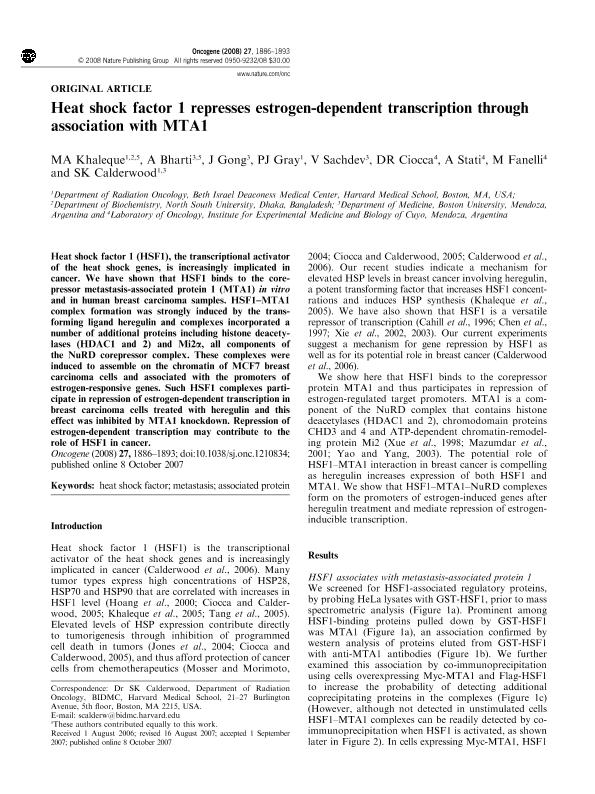Mostrar el registro sencillo del ítem
dc.contributor.author
Khaleque, M. A.
dc.contributor.author
Bharti, A.
dc.contributor.author
Gong, J.
dc.contributor.author
Gray, P. J.
dc.contributor.author
Sachdev, V.
dc.contributor.author
Ciocca, Daniel Ramon

dc.contributor.author
Stati, Arturo Oscar

dc.contributor.author
Fanelli, Mariel Andrea

dc.contributor.author
Calderwood, S. K.
dc.date.available
2019-07-26T15:03:01Z
dc.date.issued
2008-03
dc.identifier.citation
Khaleque, M. A.; Bharti, A.; Gong, J.; Gray, P. J.; Sachdev, V.; et al.; Heat shock factor 1 represses estrogen-dependent transcription through association with MTA1; Nature Publishing Group; Oncogene; 27; 13; 3-2008; 1886-1893
dc.identifier.issn
0950-9232
dc.identifier.uri
http://hdl.handle.net/11336/80376
dc.description.abstract
Heat shock factor 1 (HSF1), the transcriptional activator of the heat shock genes, is increasingly implicated in cancer. We have shown that HSF1 binds to the corepressor metastasis-associated protein 1 (MTA1) in vitro and in human breast carcinoma samples. HSF1-MTA1 complex formation was strongly induced by the transforming ligand heregulin and complexes incorporated a number of additional proteins including histone deacetylases (HDAC1 and 2) and Mi2α, all components of the NuRD corepressor complex. These complexes were induced to assemble on the chromatin of MCF7 breast carcinoma cells and associated with the promoters of estrogen-responsive genes. Such HSF1 complexes participate in repression of estrogen-dependent transcription in breast carcinoma cells treated with heregulin and this effect was inhibited by MTA1 knockdown. Repression of estrogen-dependent transcription may contribute to the role of HSF1 in cancer.
dc.format
application/pdf
dc.language.iso
eng
dc.publisher
Nature Publishing Group

dc.rights
info:eu-repo/semantics/openAccess
dc.rights.uri
https://creativecommons.org/licenses/by-nc-sa/2.5/ar/
dc.subject
Oncogenes
dc.subject
Breast Cancer
dc.subject
Heat Shock Proteins
dc.subject
Her-2/Neu
dc.subject
Metastasis
dc.subject
Associated Protein
dc.subject.classification
Medicina Critica y de Emergencia

dc.subject.classification
Medicina Clínica

dc.subject.classification
CIENCIAS MÉDICAS Y DE LA SALUD

dc.title
Heat shock factor 1 represses estrogen-dependent transcription through association with MTA1
dc.type
info:eu-repo/semantics/article
dc.type
info:ar-repo/semantics/artículo
dc.type
info:eu-repo/semantics/publishedVersion
dc.date.updated
2019-06-10T21:24:59Z
dc.journal.volume
27
dc.journal.number
13
dc.journal.pagination
1886-1893
dc.journal.pais
Reino Unido

dc.journal.ciudad
Londres
dc.description.fil
Fil: Khaleque, M. A.. Harvard Medical School; Estados Unidos. North South University; Bangladesh
dc.description.fil
Fil: Bharti, A.. Boston University; Estados Unidos
dc.description.fil
Fil: Gong, J.. Boston University; Estados Unidos
dc.description.fil
Fil: Gray, P. J.. Harvard Medical School; Estados Unidos
dc.description.fil
Fil: Sachdev, V.. Boston University; Estados Unidos
dc.description.fil
Fil: Ciocca, Daniel Ramon. Consejo Nacional de Investigaciones Científicas y Técnicas. Centro Científico Tecnológico Conicet - Mendoza. Instituto de Medicina y Biología Experimental de Cuyo; Argentina
dc.description.fil
Fil: Stati, Arturo Oscar. Consejo Nacional de Investigaciones Científicas y Técnicas. Centro Científico Tecnológico Conicet - Mendoza. Instituto de Medicina y Biología Experimental de Cuyo; Argentina
dc.description.fil
Fil: Fanelli, Mariel Andrea. Consejo Nacional de Investigaciones Científicas y Técnicas. Centro Científico Tecnológico Conicet - Mendoza. Instituto de Medicina y Biología Experimental de Cuyo; Argentina
dc.description.fil
Fil: Calderwood, S. K.. Boston University; Estados Unidos. Harvard Medical School; Estados Unidos
dc.journal.title
Oncogene

dc.relation.alternativeid
info:eu-repo/semantics/altIdentifier/doi/http://dx.doi.org/10.1038/sj.onc.1210834
dc.relation.alternativeid
info:eu-repo/semantics/altIdentifier/url/https://www.nature.com/articles/1210834
Archivos asociados
